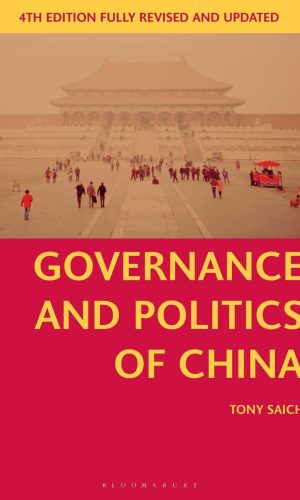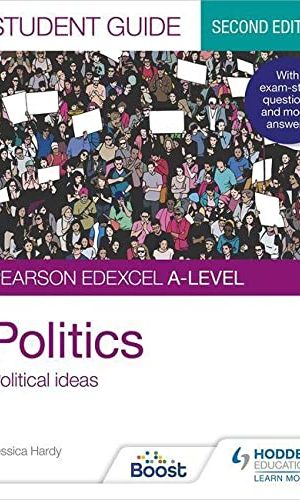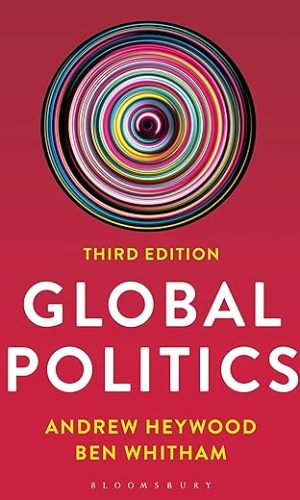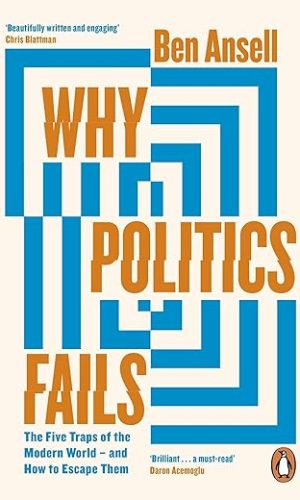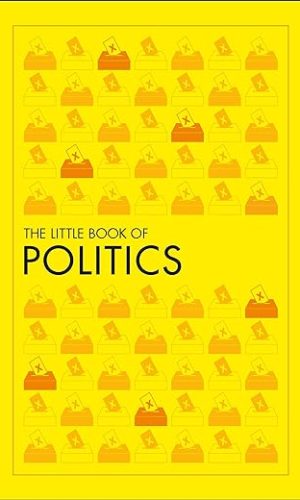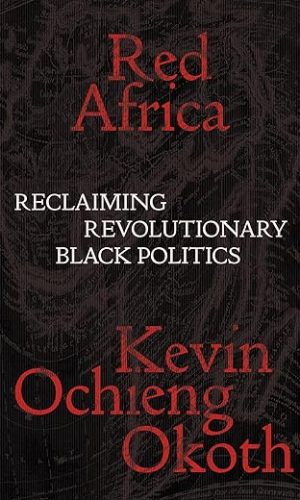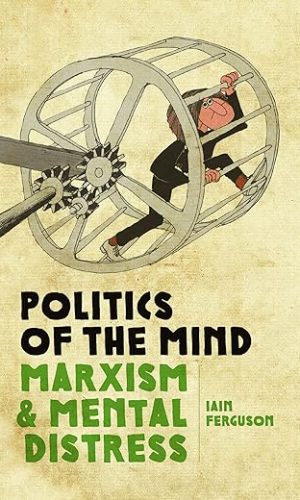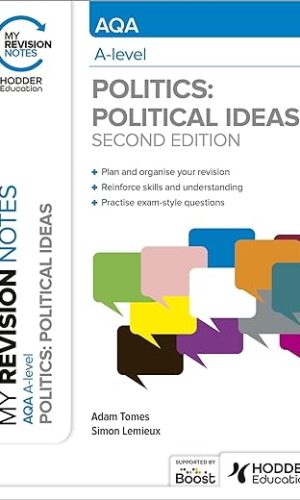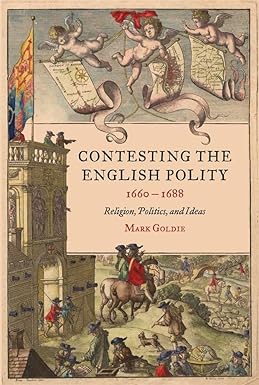Government & Politics
-
Governance and Politics of China: 42 (Comparative Government and Politics)
The success or failure of China’s development will impact not only its own citizens but also those of the world. China is widely recognized as a global actor on the world stage and no global challenge can be resolved without its participation. Thus, it is important to understand how the country is ruled and what the policy priorities are of the new leadership. Can China move to a more market-based economy, while controlling environmental degradation? Can it integrate hundreds of millions of new migrants into the urban landscape? The tensions between communist and capitalist identities continue to divide society as China searches for a path to modernization.The People’s Republic is now over 65 years old – an appropriate juncture at which to reassess the state of contemporary Chinese politics. In this substantially revised fourth edition and essential guide to the subject, Tony Saich delivers a thorough introduction to all aspects of politics and governance in post-Mao China, taking full account of the changes of the 18th Party Congress and the 12th National People’s Congress. Further, the rise of Xi Jinping to power and his policies are examined as are important policy areas such as urbanization and the fight against corruption.
Read more
£32.30£37.00 -
Pearson Edexcel A-level Politics Student Guide 3: Political Ideas Second Edition
This Student Guide will help you to:
* Identify key content for the exams with our concise coverage of topics
* Avoid common pitfalls with clear definitions and exam tips throughout
* Reinforce your learning with bullet-list summaries at the end of each section
* Make links between topics with synoptic links highlighted throughout
* Test your knowledge with rapid-fire knowledge check questions and answers
* Find out what examiners are looking for with our Questions & Answers section, for the core political ideas, plus Anarchism, Feminism and NationalismRead more
£9.50 -
Global Politics
This systematic and integrated analysis of the theory and practice of contemporary international relations, covers traditional and critical theory, core issues and recent developments in the field. Diversified and dewesternised, this new edition takes an impartial, global approach and considers a broad range of issues and actors. It places traditional Western thinkers in their historical context and brings in new, critical voices to show what the field of IR looks like today. A new critical theories chapter, expanded ‘Approaches To…’ boxes and accounts of the latest scholarship give readers a nuanced and pluralistic overview of IR theory. Updated empirical case studies bring the subject matter to life, and show how concepts and theories apply in practice.Revised and updated by new co-author Ben Whitham, this new edition offers:
– Updated key developments, from important social movements such as Black Lives Matter and MeToo to coverage of resurgent ethno-politics and nationalisms
– Full page case studies of ‘Global Politics in Action’, illuminating major events in world affairs
– ‘Global Actor’ case studies considering the nature and significance of key players on the world stage, from Google to the G-20
– ‘Focus on’ and ‘Debating’ features looking closely at issues and approaches and enable readers to develop their own critical skills
– ‘Key Concepts’ boxes and a marginal glossary, along with discussion questions and suggestions for further reading aid study and reinforce learning
– Online resources with materials for both lecturers and students, offering exam questions, PowerPoint slides, online-only case-studies, self-test questions, and more.This is the ideal text for lecturers and students looking for a broad, contemporary and inspiring overview of global politics today.
Read more
£30.40£35.10Global Politics
£30.40£35.10 -
Why Politics Fails: The Five Traps of the Modern World & How to Escape Them
From the 2023 Reith lecturer
Politics is failing us. This is why.
‘Brilliant . . . a must-read’ Daron Acemoglu, co-author of Why Nations Fail
When it comes to politics, there are five goals that voters generally agree upon. We all want a say in how we’re governed, to be treated equally, a safety net when times are hard, protection from harm and to be richer in the future. So, why does politics not deliver that?
The problem is each of these five goals results in a political trap. For example, we all want a say in how we’re governed, but it’s impossible to have any true ‘will of the people’. And we want to be richer tomorrow, but what makes us richer in the short run makes us poorer over the long haul.
In Why Politics Fails, award-winning Oxford professor Ben Ansell draws on examples from Ancient Greece through Brexit to vividly illustrate how we can escape these traps, overcome self-interest and deliver on our collective goals. Politics seems to be broken, but this book shows how it can work for everyone.
‘A meticulous study of how different societies find it so difficult to achieve widely shared goals’ Financial Times
‘Incisive and gripping’ Daniel Ziblatt, co-author of How Democracies Die
‘Salutary reading for the world we live in now’ James A. Robinson, co-author of Why Nations Fails
Read more
£10.10£10.40 -
The Little Book of Politics (Big Ideas)
This book is the perfect pocket-sized introduction to politics and political thought throughout history.
From the origins of democracy to Machiavelli’s cunning statecraft, and from Rousseau’s “social contract” to the American Declaration of Independence, Marxist communism, the dawn of populism, and identity politics, The Little Book of Politics examines the philosophies behind the different political beliefs and methods of government used around the world over the course of human history.
Packed with infographics and flowcharts that explain complex concepts in a simple but exciting way, The Little Book of Politics offers you a combination of clear text and hard-working infographics in a portable format that is perfect for reading on the go.
Read more
£7.60£9.50The Little Book of Politics (Big Ideas)
£7.60£9.50 -
Red Africa: Reclaiming Revolutionary Black Politics (Salvage Editions)
Red Africa makes the case for a revolutionary Black politics inspired by Marxist anti-colonial struggles in Africa. Kevin Ochieng Okoth revisits historical moments when Black radicalism was defined by international solidarity in the struggle against capitalist-imperialism, that together help us to navigate the complex histories of the Black radical tradition. Hechallenges common misconceptions about national liberation, showing that the horizon of national liberation was not limited to the nation-building projects of post-independence governments. While African socialists sought to distance themselves from Marxism and argued for a ‘third way’ socialism rooted in ‘traditional African culture’ the intellectual and political tradition Okoth calls ‘Red Africa’ showed that Marxism and Black radicalism were never incompatible.The revolutionary Black politics of Eduardo Mondlane, Amílcar Cabral, Walter Rodney and Andrée Blouin gesture toward a decolonised future that never materialised. We might yet build something new from the ruins of national liberation, something which clings onto the utopian promise of freedom and refuses to let go. Red Africa is not simply an exercise in nostalgia, it is a political project that hopes to salvage what remains of this tradition―which has been betrayed, violently suppressed, or erased―and to build from it a Black revolutionary politics capable of imagining new futures out of the uncertain present.
Read more
£7.20£8.50 -
Politics of the Mind: Marxism and Mental Distress (2nd edition)
Mental distress has become one of the key “public issues of the 21st century”. This edition of Politics of the Mind: Marxism and Mental Distress looks at the link between the economic and political system under which we live ― capitalism ― and the enormously high levels of mental distress that we see in the world today.
A new introductory chapter explores the impact on mental health of the “multiple crises” of the system including the Covid-19 pandemic and climate change, discusses the significance of new research that challenges the biomedical model and assesses the implications for mental health and mental health services of political developments since the book was first published in 2017.
Read more
£9.20£9.50 -
Late Fascism: Race, Capitalism and the Politics of Crisis
In a world shaken by ecological, economic and political crises, the forces of authoritarianism and reaction seem to have the upper hand. How should we name, map and respond to this state of affairs?Late Fascism turns to theories of fascism produced in the past century, testing their capacity to illuminate our moment and challenging many of the commonplaces that debate on this extremely charged term devolves into. It can be tempting for any contemporary assessment of fascism to reach for historical analogy. Fascism is defined by returns and repetitions, but it is not best approached in terms of steps and checklists dictated by a selective reading of Italian Fascism or National Socialism.
Rather than treating fascism as an unrepeatable phenomenon or identifying it with a settled configuration of European parties, regimes, and ideologies, Toscano approaches fascism as a problem and a process, one that is intimately linked to capitalism’s demands for domination. Drawing especially on Black radical and anti-colonial theories of racial fascism, Late Fascism makes clear the limits of identifying fascism simply with the political violence of bygone European regimes. Developing anti-fascist theory is a vital and urgent task. From the “Great Replacement” to campaigns against critical race theory and “gender ideology”, today’s global far-right is launching lethal panics about the threats to traditional political, sexual and racial regimes. Late Fascism allows us to rediscover some truly inspiring anti-fascist thinkers, rooted in their turn in largely anonymous collective practices of worldmaking against domination, traditions of the oppressed that remain a resource for those set on dismantling the hierarchies and segregations that the partisans of Order and Tradition seek to revive and reimpose.
Read more
£12.70£17.10 -
No Politics But Class Politics
Denouncing racism and celebrating diversity have become central mainstays of progressive politics: for many on the left, social justice consists of equitable distribution of wealth, power, and esteem among racial groups. But as Adolph Reed, Jr. and Walter Benn Michaels argue in this groundbreaking collection of essays, the emphasis seems to be tragically misplaced. Not only does a fixation with racial disparities distract from the pervasive influence of class―it actually legitimises economic inequality. Adolph Reed, Jr. is the towering radical theorist of American democracy of his generation.” ―Cornel West “Walter Benn Michaels is cunning, brilliant, acutely suggestive, exhilarating to read.” ―Eric Lott “For decades, Adolph Reed and Walter Benn Michaels have brought common as well as uncommon sense to the analysis of politics under oligarchic late capitalism.” ―Barbara J. Fields “Wokelords and anti-racist liberals will be frustrated, enraged, and defeated. This book pushes us closer towards the uncompromising, bare-knuckled anti-capitalist movement we so desperately need.” ―Cedric Johnson “An exhilarating journey that swaps the orthodoxies of contemporary progressive culture for a class politics rooted in universalism.” ―James Bloodworth “Adolph Reed, Jr. and Walter Benn Michaels have been among the clearest voices critiquing the dominant race reductionism in American intellectual life and proposing a real egalitarian alternative.” ―Bhaskar Sunkara “Anyone interested in the politics of race and class must push aside the dogma of identity and grapple with what Reed, Jr. and Michaels have been arguing for decades.–Jodi Dean “These essays tell the story of the last seven decades, charting the decline of the left and American politics. The result is as rich as it is rare: a long view that is pressing and immediate.” ―Corey Robin “Reed, Jr. and Michaels take a hammer to common ways of thinking about race, class, inequality and identity, revealing ugly truths, and challenging us out of our comfort zones.” ―Kenan MalikRead more
£15.90£19.00No Politics But Class Politics
£15.90£19.00 -
How Migration Really Works: A Factful Guide to the Most Divisive Issue in Politics
Authoritative and myth-busting, this is the one book you need to read to understand why we’ve been wrong about migration
‘An important book that will force Left and Right alike to reconsider old assumptions’ The Telegraph
‘This book should be falling out of briefcases all over Westminster’ Tortoise Media
‘Careful, balanced and convincing . . . challenges much of what we think is obvious about migration’ Ian Morris, author of Why the West Rules – For Now
———————————–
Global migration is not at an all-time high.
Climate change will not lead to mass migration.
Immigration mainly benefits the wealthy, not workers.
Border restrictions have paradoxically produced more migration.
These statements might sound counter-intuitive or just outright wrong – but the facts behind the headlines reveal a completely different story to the ones we’re told about migration. In this ground-breaking and revelatory book, based on more than three decades of research, leading expert Professor Hein de Haas explodes myths espoused by both left and right that politicians, interest groups and media regularly spread about migration.
Comparing trends and perspectives from Western ‘destination countries’ (UK, US and Europe) as well as ‘origin countries’ in Asia, Africa and Latin America, de Haas equips readers with essential knowledge on migration based on the best evidence and data, showing migration not as a problem to be solved, nor as a solution to a problem, but as it really is.
Above all, How Migration Really Works offers a new vision of migration based on facts rather than fears, and a paradigm-altering understanding of this perennially important subject.
Read more
£19.00£23.80 -
My Revision Notes: AQA A-level Politics: Political Ideas Second Edition
My Revision Notes will engage students with our updated approach to consolidating course content and helping them learn, practise and apply their skills and understanding. Coverage of key content is combined with practical study tips and effective planning strategies to create a guide that students can rely on to build both knowledge and confidence.
– Helps students plan and manage their learning independently with our topic-by-topic planner
– Encourages students to practise and apply their skills and knowledge with regular ‘Now test yourself’ sections, refreshed practice questions and answer guidance online
– Supports subject-specific exam skills with a new exam skills box at the end of each chapter
– Reflects the structure and format of recent exams with refreshed exam-style questions and improved course coverage
– Includes content mapped to the specification, streamlined to give students the knowledge they need to help with the exams
– Covers content for the Political Ideas component of the AQA specification
– Helps students understand key terms with user-friendly definitions and tips throughout, plus a glossaryRead more
£11.40 -
US Politics Annual Update 2023
– Review all the developments relevant to A-level specifications in US politics from the last year, with strong links between topics and focused suggestions for further reading
– Develop your confidence with expert analysis you can draw on both throughout your course and in the exams
– Enhance your knowledge of the news to build a bank of up-to-date examples linked to the specifications, helping you to develop persuasive arguments for your essays
– Use our updated exam skills feature to clarify how to use the information you have just learned in your examChapters:
– The January 6 Committee
– ‘The legislative branch’: does Congress fulfil its legislative role adequately?
– ‘I control foreign policy’: has the president retained primacy?
– The Supreme Court 2021-22: has Chief Justice Roberts lost control of his Court?
– Abortion in the USARead more
£10.40 -
The Politics of Language
A provocative case for the inherently political nature of language
In The Politics of Language, David Beaver and Jason Stanley present a radical new approach to the theory of meaning, offering an account of communication in which political and social identity, affect, and shared practices play as important a role as information. This new view of language, they argue, has dramatic consequences for free speech, democracy, and a range of other areas in which speech plays a central role.
Drawing on a wealth of disciplines, The Politics of Language argues that the function of speech―whether in dialogue, larger group interactions, or mass communication―is to attune people to something, be it a shared reality, emotion, or identity. Reconceptualizing the central ideas of pragmatics and semantics, Beaver and Stanley apply their account to a range of phenomena that defy standard frameworks in linguistics and philosophy of language―from dog whistles and covert persuasion to echo chambers and genocidal speech. The authors use their framework to show that speech is inevitably political because all communication is imbued with the resonances of particular ideologies and their normative perspectives on reality.
At a time when democracy is under attack, authoritarianism is on the rise, and diversity and equality are being demanded, The Politics of Language offers a powerful new vision of the language of politics, ideology, and protest.
Read more
£33.30The Politics of Language
£33.30 -
Contesting the English Polity, 1660-1688: Religion, Politics, and Ideas: 49 (Studies in Early Modern Cultural, Political and Social History)
What did people in Restoration England think the correct relationship between church state should be? And how did this thinking evolve? Based on the author’s published essays, revised and updated with a new overarching introduction, this book explores the debates in Restoration England about “godly rule”. The book assesses some of the crucial transitions in English history: how the late Reformation gave way to the early Enlightenment; how Royalism became Toryism and Puritanism became Whiggism; how the power of churchmen was challenged by virulent anticlericalism; how the verities of “divine right” theory revived and collapsed. Providing a distinctive account of English thought in the era between the two revolutions of the Stuart century, “Contesting the English Polity, 1660-1688” discusses the ideological foundations of emerging party politics, and the deep intellectual roots of competing visions for the commonwealth, placing the power of religion, and the taming of religion, squarely alongside constitutional battles within secular politics.Read more
£82.80£90.30 -
S.H.O.R.E.: The Ultimate Descent
The Club was the Board’s international affiliate and provided professional accountants from Asia with a networking forum in their adopted country, the United States. However, despite its fancy claims, the non-profit was not run transparently, forcing a young, energetic lady, Olive, to run her voice. She and her Like-Minded friends wanted transparency and fair treatment for all. Though supported by junior members, she was confronted by the patriarchal mindset that discourages women’s involvement in manly matters. She fought her way through to the top only to find the malice deep-rooted and highly exhausting for an honest individual.Read more
£3.10 -
The Dean of Shandong: Confessions of a Minor Bureaucrat at a Chinese University
An inside view of Chinese academia and what it reveals about China’s political system
On January 1, 2017, Daniel Bell was appointed dean of the School of Political Science and Public Administration at Shandong University―the first foreign dean of a political science faculty in mainland China’s history. In The Dean of Shandong, Bell chronicles his experiences as what he calls “a minor bureaucrat,” offering an inside account of the workings of Chinese academia and what they reveal about China’s political system. It wasn’t all smooth sailing―Bell wryly recounts sporadic bungles and misunderstandings―but Bell’s post as dean provides a unique vantage point on China today.
Bell, neither a Chinese citizen nor a member of the Chinese Communist Party, was appointed as dean because of his scholarly work on Confucianism―but soon found himself coping with a variety of issues having little to do with scholarship or Confucius. These include the importance of hair color and the prevalence of hair-dyeing among university administrators, both male and female; Shandong’s drinking culture, with endless toasts at every shared meal; and some unintended consequences of an intensely competitive academic meritocracy. As dean, he also confronts weightier matters: the role at the university of the Party secretary, the national anticorruption campaign and its effect on academia (Bell asks provocatively, “What’s wrong with corruption?”), and formal and informal modes of censorship. Considering both the revival of Confucianism in China over the last three decades and what he calls “the Communist comeback” since 2008, Bell predicts that China’s political future is likely to be determined by both Confucianism and Communism.
Read more
£17.70£20.90 -
The Sisterhood: The Secret History of Women at the CIA
THE ACCLAIMED AUTHOR OF CODE GIRLS RETURNS WITH A REVELATORY HISTORY OF THREE GENERATIONS AT THE CIA – THE WOMEN WHO FOUGHT TO BECOME OPERATIVES, T RANSFORMED SPYCRAFT, AND TRACKED DOWN OSAMA BIN LADEN.
‘This masterful book cements Liza Mundy as one of our foremost historians. It’s an absolute epic. Ignore this book – and these astonishing women – at your peril.’ ― Kate Moore, bestselling author of The Radium Girls
‘A rip-roaring read about spycraft and the CIA’s inner workings . . . an inspiring group portrait of extraordinary CIA women whose careers are multisided profiles in courage.’ ― Steve Coll, Pulitzer Prize-winning author of Ghost Wars
‘An indispensable history, untold until now, The Sisterhood has stellar reporting, sparkling writing, and shocking revelations of power struggles inside the world’s most famous secret intelligence service.’ ― Tim Weiner, National Book Award-winning author of Legacy of Ashes
‘A must-read for anyone interested in national security, secrets, and the CIA.’ ― Annie Jacobsen, bestselling author of Surprise, Kill, Vanish
‘A vivid, compelling, and important book.’ – Kirkus Reviews
Created in the aftermath of World War II, the Central Intelligence Agency relied on women even as it attempted to channel their talents and keep them down. Women sent cables, made dead drops, and maintained the agency’s secrets. Despite discrimination – even because of it – women who started as clerks, secretaries, or unpaid spouses rose to become some of the CIA’s shrewdest operatives.
They were unlikely spies – and that’s exactly what made them perfect for the role. Because women were seen as unimportant, pioneering female intelligence officers moved unnoticed around Bonn, Geneva, and Moscow, stealing secrets from under the noses of their KGB adversaries. Back at headquarters, women built the CIA’s critical archives – first by hand, then by computer. And they noticed things that the men at the top didn’t see. As the CIA faced an identity crisis after the Cold War, it was a close-knit network of female analysts who spotted the rising threat of al-Qaeda – though their warnings were repeatedly brushed aside.
After the 9/11 attacks, more women joined the agency as a new job, targeter, came to prominence. They showed that data analysis would be crucial to the post-9/11 national security landscape – an eff ort that culminated spectacularly in the CIA’s successful eff ort to track down bin Laden in his Pakistani compound.
Propelled by the same meticulous reporting and vivid storytelling that infused Code Girls, The Sisterhood offers a riveting new perspective on history, revealing how women at the CIA ushered in the modern intelligence age, and how their silencing made the world more dangerous.
Read more
£19.60£23.80 -
The Walls of Santiago: Social Revolution and Political Aesthetics in Contemporary Chile: 30 (Protest, Culture & Society, 30)
A photo-illustrated record of Chilean protest art, along with reflections on artistic antecedents, global protest movements, and the long shadow cast by Chile’s authoritarian past.
From October 2019 until the COVID-19 lockdown in March 2020, Chile was convulsed by protests and political upheaval, as what began as civil disobedience transformed into a vast resistance movement. Throughout, the most striking aspects of the protests were the murals, graffiti, and other political graphics that became ubiquitous in Chilean cities.
Authors Terri Gordon-Zolov and Eric Zolov were in Santiago to witness and document the protests from their very beginning. The book is beautifully illustrated with over 150 photographs taken throughout the protests. Additional photos will be available on the publisher’s website.
From the introduction:
In the conclusion, we take stock of the crisis of the nation-state in the contemporary era. This chapter brings events into the present moment, noting the ways President Piñera took advantage of the COVID-19 pandemic to reclaim the streets of Santiago, a phenomenon echoed in countries across the globe. While most of the global protest movements were forced to go underground (or into the ether), the Black Lives Matter movement surged in the United States and drew massive amounts of support both domestically and abroad, suggesting a continued wave of grassroots protests. We close with reflections on the continued relevance of walls in a virtual world, the testimonial role that protest graphics play, and the future outlook for revolutionary movements in Chile and worldwide.Read more
£34.20£38.00 -
Mission Zero: The Independent Net Zero Review
Mission Zero is a landmark independent report into the delivery of the UK’s commitment to net zero carbon dioxide emissions by 2050. Chaired by Chris Skidmore, the UK’s former Energy Minister who was responsible for signing net zero into law, its conclusions set out, for the very first time, a new economic narrative for climate policy, demonstrating the vast financial opportunity that net zero can deliver.
This timely and crucial report acts as a template for how all countries can map out future challenges and opportunities and, above all, deliver their own pathway to net zero while also creating new jobs, industries and investment for the future.
Commissioned by the UK’s Prime Minister in September 2022, Mission Zero is the largest engagement exercise on net zero conducted to date and has been widely recognised as the most informative and detailed document on the topic, covering every sector and aspect of society. This important book is a vital piece of work and an indispensable must-read for anyone interested in energy, climate and sustainability policy.
Read more
£12.79£14.99Mission Zero: The Independent Net Zero Review
£12.79£14.99 -
When Science Meets Power
Science and politics have collaborated throughout human history, and science is repeatedly invoked today in political debates, from pandemic management to climate change. But the relationship between the two is muddled and muddied.
Leading policy analyst Geoff Mulgan here calls attention to the growing frictions caused by the expanding authority of science, which sometimes helps politics but often challenges it.
He dissects the complex history of states’ use of science for conquest, glory and economic growth and shows the challenges of governing risk – from nuclear weapons to genetic modification, artificial intelligence to synthetic biology. He shows why the governance of science has become one of the biggest challenges of the twenty-first century, ever more prominent in daily politics and policy.
Whereas science is ordered around what we know and what is, politics engages what we feel and what matters. How can we reconcile the two, so that crucial decisions are both well informed and legitimate?
The book proposes new ways to organize democracy and government, both within nations and at a global scale, to better shape science and technology so that we can reap more of the benefits and fewer of the harms.
Read more
£20.00£25.00When Science Meets Power
£20.00£25.00

